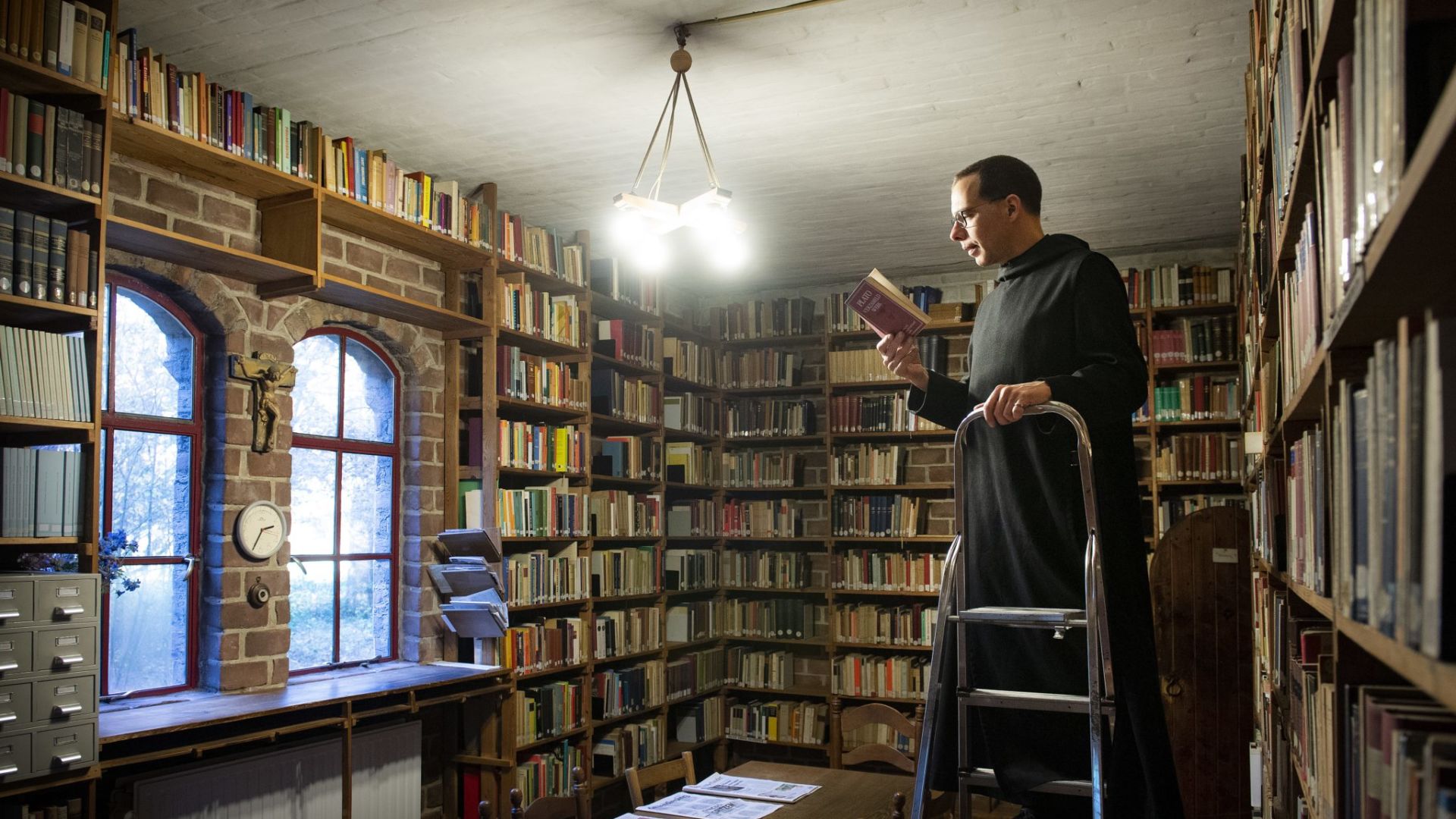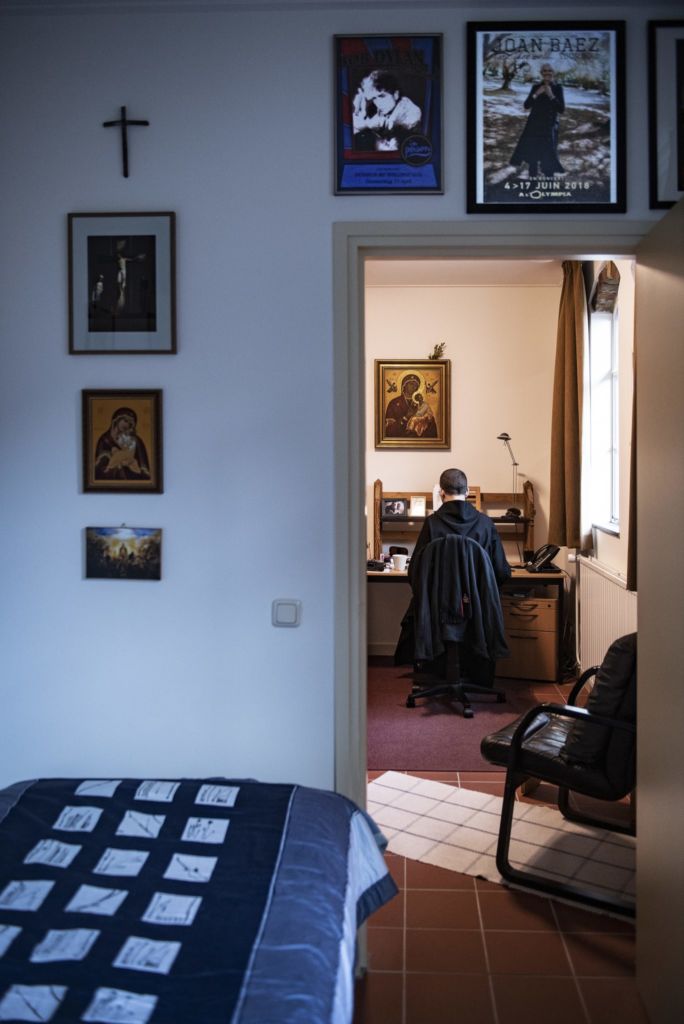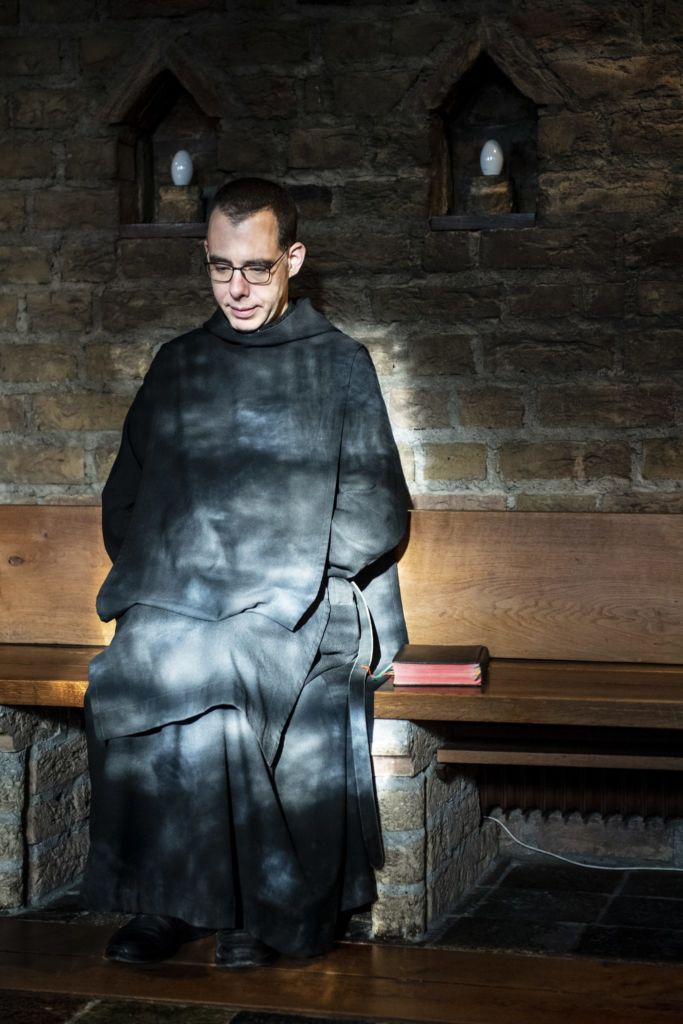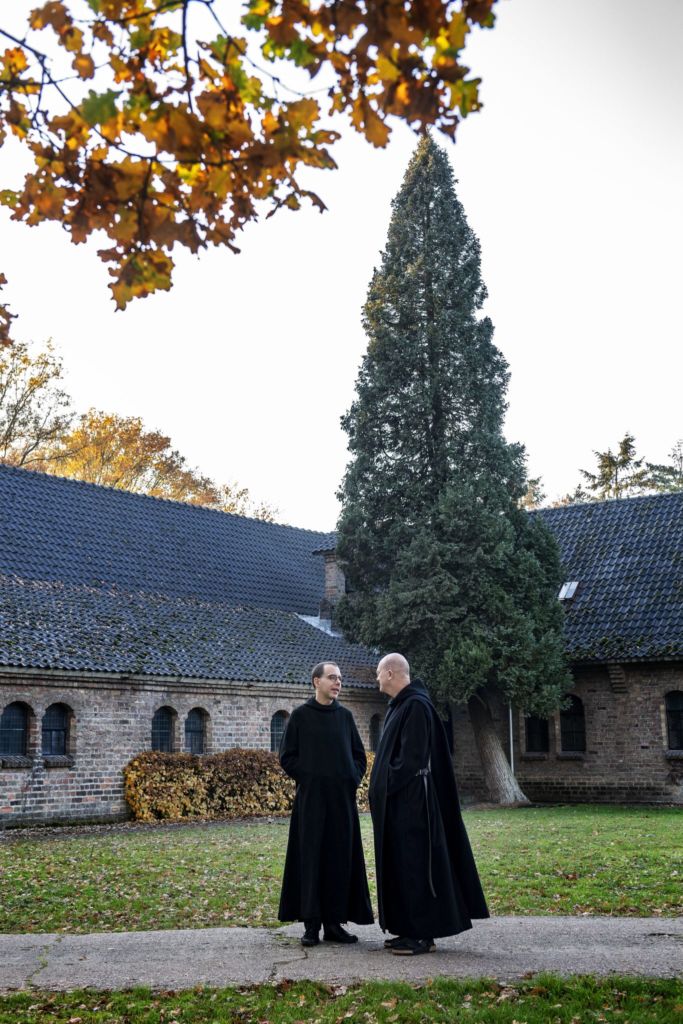After taking his vows Thomas Quartier doubled his number of publications
-
 Thomas Quartier in 2018. Foto: Bert Beelen.
Thomas Quartier in 2018. Foto: Bert Beelen.
Ritual researcher Thomas Quartier lives in the St. Willibrord’s Abbey in Doetinchem. He sings psalms and mops the hallway floors on a weekly basis. When the bell rings for evening prayers, he gets up and walks to church. ‘That which seems most pointless is our core business here.’
Quarter past noon on the dot, six kilometres outside Doetinchem. The small Neo-Roman church of the St. Willibrord’s Abbey – made of bricks from the stone factories of the Achterhoek – is pretty full for this afternoon mass. Their hands folded under their black habit, eleven monks sing psalms.
One of them is Thomas Quartier, Director of the Benedictine Centre for Liturgical Studies at Radboud University, and Professor at KU Leuven. For the past five years, he’s spent three and a half hours here every day. “It’s an emotional place for me. I fell in love with this church.”

Among the Benedictines, the researcher is the odd man out. Normally, the Order’s monks never leave the abbey, but that doesn’t apply to Quartier: he’s in Nijmegen two days a week, in Leuven once a month, and in Rome three weeks a year.
After the afternoon prayers, the monks walk one by one towards the canteen. In the bare room, they take their seats. There’s no talking during lunch. In celebration of the current Abbot’s third anniversary as head of the Abbey, Monteverdi’s Vespers of the Virgin Mary can be heard through the speakers.
The soup terrine passes from hand to hand, and the monks eat their soup in silent concentration. When everyone’s done, a Brother comes around with a trolley to pick up the empty plates. The soup is quickly followed by a pasta dish with fish – vegetarian Quartier is offered a meat substitute – and a fruit pudding.
“Shortly after taking my vows, I gained a lot of weight,” says Quartier as we share a cup of coffee after lunch. “There’s a tendency to eat much too much here. But I’ve lost the extra weight since.”
Petrol station
And to think that the Kranenburg-born Quartier never intended to study Theology. “My father died when I was 19, and I didn’t know what to do with my life,” he says.
“I happened to be classmates with the son of Herman Häring, at the time Dean of Theology at Radboud University. ‘Come and study at our Faculty,’ the Dean told me. I drove across the border every day and didn’t even have to rent a room. And now, 25 years later, I’m still affiliated with the University.”
After his studies, Quartier’s career really took off. Even before defending his PhD, he had already been offered a permanent contract. He worked hard, and attended many international conferences. Quartier: “Like many, I was married to my academic career.”
As he turned 35, Quartier began to wonder whether he wanted to continue in this vein until retirement. “It wasn’t a principle-based decision on my part not to get married, it just never happened. But I did miss a kind of life form.”
Quartier had visited the St. Willibrord’s Abbey in Doetinchem on an abbey weekend with his students. The place appealed to him, an appeal that went beyond professional interest. “For a long time I thought I only needed a spiritual petrol station to fill my tank once a month. But the contemplation, silence, openness and predictable rhythm of the Abbey appealed to me more and more.”
At a certain point, Quartier came to the realisation that he wasn’t a researcher who occasionally visited the Abbey, but a monk whose craft was academic work. “That is not to say that everyone suffering from a mid-life crisis should join a monastery. If you’d told me eight years ago that I would end up in an abbey, I would have run the other way screaming. Every day you have to put your own priorities aside. When I have a deadline and the bell rings for vespers (evening prayers, Eds.) at ten to five, I walk to church. That which is seemingly pointless is our core business here. It’s incredibly salubrious.”
Bob Dylan
Now aged 45, Quartier, a wordsmith if ever there was one, still has a boyish air about him. In his own words, the extravert monk needs the regularity of monastery life to remain in balance. “I teach seventy to eighty public lectures per year; sometimes I don’t get home until 1 a.m. Luckily, I don’t get tired easily.”
Quartier takes us to his monastery cell. It’s not easy to keep up with his fast walking pace through the dark monastery corridors. Via a low door we enter the first room, a small office with a desk, a bookcase, and a modest CD collection. A bed only just fits in the adjoining bedroom.
‘It’s here, ironically, that I rediscovered music’
The walls are adorned with a hand-painted icon, but also some portraits of Bob Dylan and Joan Baez. “When I first joined the monastery, I thought you could only sing Gregorian chants and psalms in Dutch translation. But it’s here, ironically, that I rediscovered music.”
On the chair lies a scarf from FC Cologne. Wistfully, Quartier remembers the matches played by his favourite club at the RheinEnergieStadion. “I hope to go to another FC Cologne match soon. When I was young, we often went to Cologne. I love the openness, playfulness and nonchalance of the Rhineland.”
Side effect
And yet the monk also uses his monastery cell, equipped with an excellent Wi-Fi connection, to work. “I use Skype to supervise theses and PhD theses. If I feel like the walls are closing in on me, I take a pile of exam papers to the Abbey library.”

Quartier is absolutely convinced that life at the Abbey has made him a better researcher. “The 1990s were a decade of hysterical objectivity claims in the humanities. Anyone who took a religious stance or a different perspective was dismissed as being non-objective. I have the feeling that when I give interviews wearing my habit, people are more open to what really interests them. That doesn’t make my approach any less scientific than that of my colleagues. By the way, I also notice that many students are looking for this kind of engaged form of science.”
The monk believes that a clear identity has added value for a humanities researcher. “By adopting an impartial perspective in my research, I gain insights I could never achieve otherwise. Take the feeling for rituals: I can only really enter into dialogue with participants if I talk to them on their level. You have to get a feel for what you want to investigate, and genuinely step into it; otherwise you’ll miss the ritual boat.”
Since joining the Order Quartier has doubled his number of publications. “Despite the many interruptions for prayer services, I have an ideal rhythm here. But I should rap myself on the knuckles for saying things like this: it’s not what monastery life is about.”
Since he’s often away from the abbey, Quartier has relatively few house duties. One afternoon a week he has to clean the hallways, and walks through corridors wielding a gigantic mop. He then vacuums up the dust he has collected. “I don’t feel superior to the other Brothers because I have fewer tasks. Sometimes I even feel unacknowledged. My fellow Brothers have no idea how hard I work to finish a book on time.”
The Professor does not see his fellow Brothers as colleagues, let alone friends. “In a monastery, you need to keep a healthy distance, otherwise cliques form. If you’re incapable of maintaining a certain degree of self-relativisation, you won’t make it here. But all in all, we have relatively good relations with each other.”
Godchild
We go outside for a moment. The monk is keen to show us the silence centre located in the former bull stables of the Abbey. The fall of the Berlin Wall led to a massive import of cheap meat from the East, and the monks had to find other sources of income. “We are entirely self-sufficient,” says Quartier. “Our guest quarters can accommodate ten individual visitors and groups of up to 21 persons. I often teach courses there about our spirituality. And I contribute some income through my work at the University and the lectures I give.”

In the garden, Quartier explains that obedience is also part of monastery life. An old plane tree is losing its leaves, a blanket of dew covers the grass. In the distance, you can hear the sounds of a busy road. In summer, the monks take a daily walk around the estate. “If I’m asked by Radboud Reflects to give a lecture or if I want to attend my godchild’s birthday party, I have to ask the Abbot for permission. If you can surrender to this, you become freer in life. It’s a paradox, of course: a life of obedience is the ultimate act of disobedience.”
‘Not everyone suffering from a mid-life crisis should join a monastery’
Quartier finds the question of whether he wants to remain in the monastery for the rest of his life ‘a difficult one’. “It’s a bit like with marriage: most marriages end in divorce, but nobody starts out with the intention of separating. This is also how I see my life at the monastery. More than half of the monks who join the Order leave after a few years. After a while, they don’t find it so special anymore to walk dark corridors at the crack of dawn wearing a habit, or they have issues with communal life.”
Duiven
It’s now 9.15 p.m. After the last mass of the day, Quartier walks to his monastery cell to write a few personal e-mails. “I never go to bed later than 10 p.m. My alarm clock goes off at 5.15 a.m.: it’s always a struggle to get up, but I manage. When I was a student, I often partied until the morning. These days, I think it’s more rock-‘n’-roll to sit on my meditation plank at 5.45 a.m.”
Quartier continues to combine research and his life as a monk, although he finds it difficult at times not to be at the monastery full-time. “Sometimes I don’t make it to vespers because I’m stuck in traffic in Duiven on the way back from the University. And when I finally make it to bed at 1 a.m. after a public lecture, I still attend church at 6.15 a.m. the next morning. My Brothers sometimes say: Why don’t you sleep in? But I can’t. I belong there. My love of this life is far from over.”



